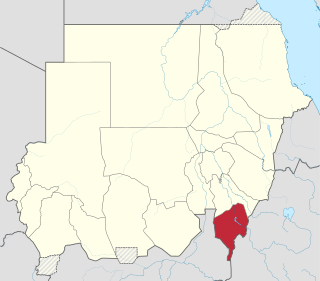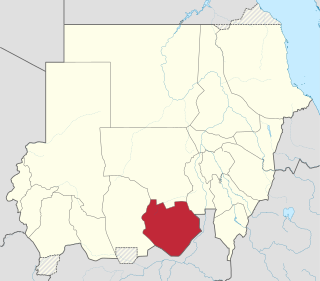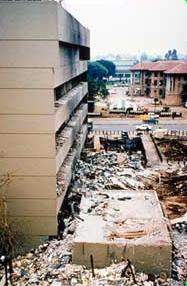
Khartoum or Khartum is the capital of Sudan. With a population of 5,274,321, its metropolitan area is the largest in Sudan. It is located at the confluence of the White Nile, flowing north from Lake Victoria, and the Blue Nile, flowing west from Lake Tana in Ethiopia. The place where the two Niles meet is known as al-Mogran or al-Muqran. From there, the Nile continues north towards Egypt and the Mediterranean Sea.

Sudan, officially the Republic of the Sudan, is a country in Northeast Africa. It is bordered with the Central African Republic to the southwest, Chad to the west, Egypt to the north, Eritrea to the northeast, Ethiopia to the southeast, Libya to the northwest, South Sudan to the south and the Red Sea. It has a population of 45.70 million people as of 2022 and occupies 1,886,068 square kilometres, making it Africa's third-largest country by area, and the third-largest by area in the Arab League. It was the largest country by area in Africa and the Arab League until the secession of South Sudan in 2011, since which both titles have been held by Algeria. Its capital city is Khartoum and its most populous city is Omdurman.

Omar Hassan Ahmad al-Bashir is a Sudanese former military officer and politician who served as the seventh head of state of Sudan under various titles from 1989 until 2019, when he was deposed in a coup d'état. He was subsequently incarcerated, tried and convicted on multiple corruption charges. He came to power in 1989 when, as a brigadier general in the Sudanese Army, he led a group of officers in a military coup that ousted the democratically elected government of prime minister Sadiq al-Mahdi after it began negotiations with rebels in the south. He was elected three times as president in elections that have been under scrutiny for electoral fraud. In 1992, al-Bashir founded the National Congress Party, which remained the dominant political party in the country until 2019. In March 2009, al-Bashir became the first sitting head of state to be indicted by the International Criminal Court (ICC), for allegedly directing a campaign of mass killing, rape, and pillage against civilians in Darfur. On 11 February 2020, the Sudanese government announced that it had agreed to hand over al-Bashir to the ICC for trial.

Blue Nile is one of the eighteen states of the Republic of the Sudan. It was established by presidential decree nº 3 in 1992 and it is named after the Blue Nile River.

South Kordofan is one of the 18 wilayat or states of Sudan. It has an area of 158,355 km² and an estimated population of approximately 1,100,000 people (2000). Kaduqli is the capital of the state. It is centered on the Nuba Mountains. At one time it was supposed that South Kordofan was the only state in (North) Sudan suitable for producing oil, but oil has also been discovered in neighboring White Nile State in larger quantities.

Before the independence of South Sudan, the States of Sudan were subdivided into 133 districts. With the adoption of the Interim National Constitution of Sudan and the Interim Constitution of Southern Sudan, the ten states of South Sudan are, however, now divided into counties. The maps on this page represent the boundaries as they existed in 2006. Current information is available from the Humanitarian Data Exchange.

The War in Darfur, also nicknamed the Land Cruiser War, is a major armed conflict in the Darfur region of Sudan that began in February 2003 when the Sudan Liberation Movement (SLM) and the Justice and Equality Movement (JEM) rebel groups began fighting against the government of Sudan, which they accused of oppressing Darfur's non-Arab population. The government responded to attacks by carrying out a campaign of ethnic cleansing against Darfur's non-Arabs. This resulted in the death of hundreds of thousands of civilians and the indictment of Sudan's president, Omar al-Bashir, for genocide, war crimes, and crimes against humanity by the International Criminal Court.

The 1998 United States embassy bombings were attacks that occurred on August 7, 1998. More than 200 people were killed in nearly simultaneous truck bomb explosions in two East African cities, one at the United States Embassy in Dar es Salaam, Tanzania, the other at the United States Embassy in Nairobi, Kenya.

A referendum took place in Southern Sudan from 9 to 15 January 2011, on whether the region should remain a part of Sudan or become independent. The referendum was one of the consequences of the 2005 Naivasha Agreement between the Khartoum central government and the Sudan People's Liberation Army/Movement (SPLA/M).

The Arab League has 22 member states. It was founded in Cairo in March 1945 with six members: the Kingdom of Egypt, Kingdom of Iraq, Lebanon, Saudi Arabia, Syrian Republic, and Transjordan. North Yemen joined on 5 May 1945. Membership increased during the second half of the 20th century. Seven countries have observer status. The headquarters are located in Cairo, Egypt.

South Sudan, officially the Republic of South Sudan, is a landlocked country in East Africa. It is bordered by Ethiopia, Sudan, the Central African Republic, the Democratic Republic of the Congo, Uganda, and Kenya. Its population was estimated at 10,913,164 in 2022. Juba is the capital and largest city.

The South Sudanese Civil War was a multi-sided civil war in South Sudan between forces of the government and opposition forces. In December 2013, President Kiir accused his former deputy Riek Machar and ten others of attempting a coup d'état. Machar denied trying to start a coup and fled to lead the SPLM – in opposition (SPLM-IO). Fighting broke out between the Sudan People's Liberation Movement (SPLM) and SPLM-IO, igniting the civil war. Ugandan troops were deployed to fight alongside the South Sudanese government. The United Nations has peacekeepers in the country as part of the United Nations Mission in South Sudan (UNMISS).

The Sudanese Revolution was a major shift of political power in Sudan that started with street protests throughout Sudan on 19 December 2018 and continued with sustained civil disobedience for about eight months, during which the 2019 Sudanese coup d'état deposed President Omar al-Bashir on 11 April after thirty years in power, 3 June Khartoum massacre took place under the leadership of the Transitional Military Council (TMC) that replaced al-Bashir, and in July and August 2019 the TMC and the Forces of Freedom and Change alliance (FFC) signed a Political Agreement and a Draft Constitutional Declaration legally defining a planned 39-month phase of transitional state institutions and procedures to return Sudan to a civilian democracy.
East al Gazera is a district of Al Jazirah state, Sudan.
Al Gadaref is a district of Al Qadarif state, Sudan.
Al Fushqa or al-Fashaga is a district of Al Qadarif state, Sudan. The capital is Showak. The district has very fertile agricultural land and forms a disputed region between Ethiopia and Sudan known as the al-Fashaga triangle.
Al Geneina is a district of West Darfur state, Sudan.

The Sudanese Professionals' Association is an umbrella association of 17 different Sudanese trade unions. The organisation started forming in October 2012, though was not officially registered due to government crackdowns on trade unions, and was created more formally in October 2016 by an alliance between unions of doctors, journalists and lawyers. In December 2018, the group called for the introduction of a minimum wage and participated in protests in Atbara against the rising cost of living. The SPA came to take an increasingly prominent role in the 2018–2019 Sudanese protests against the government of Omar al-Bashir during 2019. The organisation is also a member of the Progressive International

Abdel Fattah Abdelrahman al-Burhan is a Sudanese politician and Sudanese Army general who is the de facto head of state of Sudan as the commander-in-chief of the Sudanese Armed Forces after leading a coup d'état in October 2021 that deposed Prime Minister Abdalla Hamdok.
Sudan is a sub-district located in al-Radmah District, Ibb Governorate, Yemen. Sudan had a population of 7014 according to the 2004 census.















